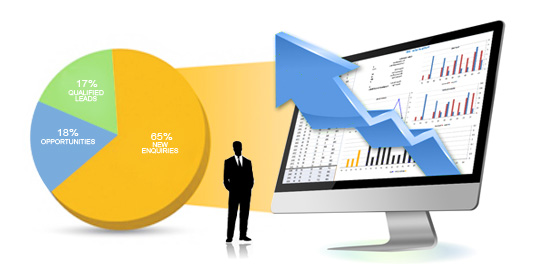CRM (customer relationship management) reporting and analytics can help small businesses transform their rate of customer retention and customer acquisition. It allows businesses to easily store and access customer data by providing a consolidated database. Businesses can utilize this data to generate reports and run analytics that allows businesses to target their ideal customer profile, develop and track efficient marketing/sales strategies, and streamline various aspects of customer management. Thus, small businesses can utilize CRM reporting and analytics to create strong end-to-end services that are driven by an analysis of consumer preferences. Effective tracking of customer interactions also helps companies make informed decisions when tackling pain points or when creating personalized content.
Some of the challenges that many small businesses face is effective tracking and management of customer relationships. For example, small businesses tend to struggle to follow up on leads that can help improve client retention, acquisition, or satisfaction. Further, small businesses also struggle with maintaining customer visibility and tracking important details regarding customers and projects. However, the problems do not end there, as many small businesses struggle to manage a growing customer base without the hiring of any new employees. If any of these problems sound familiar to you, then your business may just require CRM Rreporting and Analytics software to help boost your growth!
The Benefits Of CRM
How does CRM reporting and analytics help a small business flourish?
Centralized Customer Data: CRM reporting and analytics provide small businesses with a single, centralized database to easily access and analyze customer information.
Enhanced Customer Engagement: CRM software saves any and all types of customer data and customer interaction. Thus, businesses can use this data to glean insights into customer behavior, preferences, and needs. Companies can also strategize for targeted marketing campaigns and develop a proactive customer service team.
Efficient Customer Support: CRM reporting and analytics offer your customer support team access to a customer’s data and interactions. Being able to call up this information on demand allows customer service teams to efficiently and effectively track and fix issues. CRM software also helps a team provide timely and personalized support, increasing customer satisfaction and faster turnaround times.
Streamlined Sales Processes: A problem many businesses face is the challenge of developing a sales process that is followed consistently. CRM reporting and analytics can help a sales team manage leads, track opportunities, and better manage a sales pipeline.
Improved Marketing Strategy: By segmenting a customer base into various criteria, such as demographics, purchase, and preferences, a business can create personalized messaging and targeted campaigns that aim to achieve better traction and a higher Return on Investment.
Reporting and Analytics: Businesses can use the reporting and analytics features of CRM to develop keen customer insight. It allows a small business to track key performance indicators, measure the success of marketing and sales endeavors, and analyze sales trends.
Better Team Coordination: CRM reporting and analytics software offers the employees of a business a shared platform. It allows every employee access to the latest customer data, customer interactions, and communication history. Hence, it allows all departments to work together to achieve a company’s short and long-term goals.
CONCLUSION
As can be seen, CRM reporting and analytics help small businesses better streamline and manage their processes. It provides singular, consolidated customer data that saves any and all types of customer data, engagements, and interactions. Businesses can use this information to learn valuable insights regarding customer behavior, preferences, and complaints. A well-implemented CRM system helps small businesses overhaul their marketing strategies and sales processes. Such strategies become data-driven in nature, allowing businesses to measure and track success, as well as discover strategic or structural flaws that are preventing success.
A customer service team is better placed to access customer information and history, allowing for faster problem resolution and improved customer satisfaction. Thus, a small business can leverage CRM reporting and analytics to ensure it is maximizing its insights in a number of departments. Through CRM, A small business can expect to effectively manage its growing customer base, follow up on important leads, and efficiently store and utilize customer data. By doing so, a company can overcome many of the challenges that are faced by small businesses



